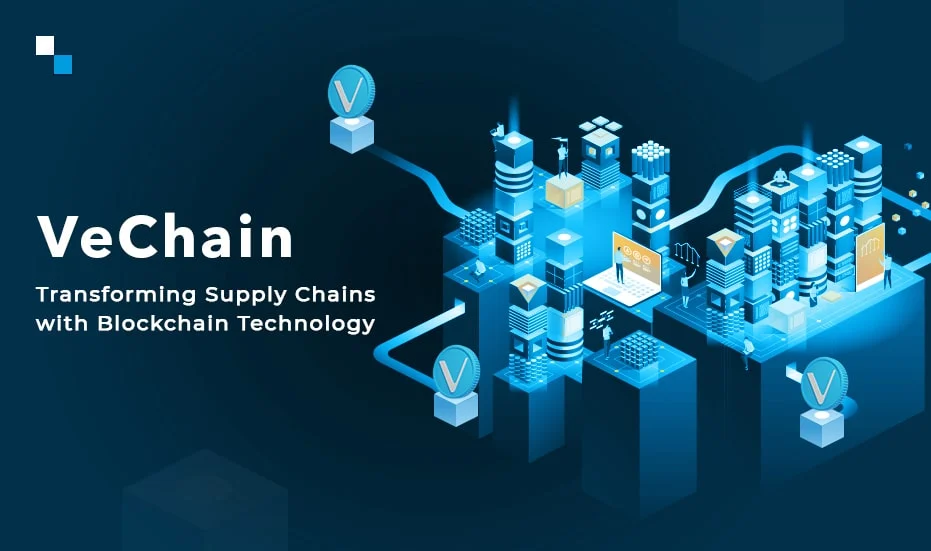VeChain in Supply Chains: Complete Details
VeChain is a blockchain platform designed to streamline supply chain management and business processes. It provides a decentralized and secure way to record, track, and manage the flow of goods across different stages of the supply chain. VeChain aims to solve real-world problems such as counterfeiting, inefficiency, and lack of transparency, which often plague traditional supply chain systems. With its focus on innovation and practicality, VeChain has become one of the prominent blockchain solutions for supply chain management.
In this article, we will explore how VeChain works in supply chains, its key features, advantages, and real-world applications.
1. Overview of VeChain and Blockchain in Supply Chains
VeChain was founded in 2015 by Sunny Lu and has grown into one of the leading blockchain platforms focused on enterprise solutions. The platform uses blockchain technology to increase transparency, traceability, and efficiency in supply chains. By utilizing smart contracts, VeChain ensures secure and automated transactions across various supply chain networks.
The key to VeChain’s success lies in its ability to integrate blockchain with existing technologies, such as the Internet of Things (IoT) and RFID tags, creating a more efficient and trustworthy ecosystem. VeChain’s blockchain is designed to handle large amounts of data, making it ideal for tracking the movement of goods across multiple stakeholders and jurisdictions.
2. How VeChain Works in Supply Chains
VeChain uses its native cryptocurrency, VET, and a dual-token system consisting of VET and VTHO. VET is used as a staking token that powers the network, while VTHO is used to pay for transaction fees within the VeChain ecosystem.
Here’s how VeChain integrates into supply chains:
2.1 Tracking Goods and Products
At the core of VeChain’s value proposition is the ability to track products across their entire lifecycle, from raw material sourcing to the final customer. By using IoT devices, RFID tags, and QR codes, businesses can track every detail about the product, including:
- Manufacturing date
- Origin of raw materials
- Transit details (shipping, storage conditions)
- Handling and quality assurance checks
- Final point of sale
Each event that occurs with the product is logged onto the VeChainThor Blockchain, creating a transparent, immutable record that can be accessed by all parties in the supply chain.
2.2 Smart Contracts and Automation
VeChain’s use of smart contracts enables automatic execution of predefined actions when certain conditions are met. For instance, when a product is received at a warehouse, the smart contract may trigger the next phase of the supply chain, such as inventory checks, payment processing, or shipment tracking.
Smart contracts help eliminate human errors, reduce costs, and improve the speed of transactions. They also enhance trust between parties, as all processes are governed by transparent and immutable rules.
2.3 Data Collection and Verification
VeChain’s blockchain technology allows various stakeholders to collect and verify data at every stage of the supply chain. This data is recorded on the blockchain, ensuring that it cannot be tampered with or altered. For example:
- Manufacturers can verify the authenticity of materials and components.
- Logistics companies can track shipments and ensure products are stored under appropriate conditions (e.g., temperature-sensitive items).
- Retailers can confirm the legitimacy of the products they are selling.
This data can also be shared with regulatory authorities, ensuring compliance with industry standards and legal requirements.
3. Key Features of VeChain for Supply Chain Management
3.1 Transparency
VeChain’s blockchain provides complete transparency of the entire supply chain. Every participant in the supply chain has access to the same data, which ensures that no one can manipulate the records. This level of transparency makes it easier for businesses and consumers to verify the authenticity of goods and services, reducing fraud and counterfeiting.
3.2 Traceability
Traceability is one of the most significant advantages of VeChain. The ability to trace a product from its origin to the end customer ensures that businesses can confirm the quality and safety of their goods. This is especially critical for industries such as food, pharmaceuticals, and luxury goods.
For example, in the food industry, VeChain can help trace the journey of an agricultural product from the farm to the supermarket shelf, ensuring that it meets health and safety standards throughout the process.
3.3 Efficiency
VeChain’s blockchain-based solutions automate many of the manual processes in supply chains. This leads to reduced paperwork, faster transactions, and fewer errors. By utilizing smart contracts, supply chain processes become more efficient, as they can automatically execute when certain conditions are met.
3.4 Security
Blockchain technology provides a high level of security. VeChain’s blockchain is designed to be tamper-proof, meaning that once a record is written, it cannot be altered or deleted. This ensures the integrity of supply chain data and protects against fraud and counterfeit goods.
3.5 Scalability
VeChain’s blockchain is highly scalable, meaning it can handle large amounts of data and transactions. This scalability makes it suitable for global supply chains, which involve thousands of transactions and data points across multiple stakeholders. VeChain has been designed to scale seamlessly as businesses grow and expand into new markets.
4. Real-World Applications of VeChain in Supply Chains
4.1 VeChain in the Automotive Industry
The automotive industry relies heavily on supply chain management to ensure that parts and materials are sourced from reputable suppliers. VeChain has partnered with several leading automotive companies, including BMW and Renrenche, to improve supply chain transparency and traceability.
For example, VeChain can be used to track the provenance of automotive parts, ensuring that they are sourced ethically and meet quality standards. It can also help improve the efficiency of vehicle maintenance by storing vehicle data (e.g., service history, mileage) on the blockchain.
4.2 VeChain in the Food Industry
The food industry faces many challenges related to food safety, quality control, and traceability. VeChain has been used in pilot projects for tracking food products, from farm to table, ensuring that consumers can trace the origins of their food and verify its authenticity.
For example, Walmart has partnered with VeChain to track the journey of food products, especially meat and vegetables, from farms to retail outlets. This not only improves food safety but also reduces food waste by making it easier to identify issues in the supply chain.
4.3 VeChain in Luxury Goods
VeChain has also made strides in the luxury goods industry, where counterfeiting is a major issue. By using VeChain’s blockchain to track the authenticity of products, businesses can ensure that their goods are not counterfeit. This is particularly valuable in sectors like watches, handbags, and jewelry, where brand reputation is closely tied to product authenticity.
For example, VeChain has partnered with luxury brands like Deloitte and Vinci to ensure that high-end products are traceable from production to the consumer.
4.4 VeChain in Pharmaceuticals
The pharmaceutical industry deals with the challenge of ensuring the safety and authenticity of drugs, especially in countries where counterfeit medications are prevalent. VeChain has been used to ensure that pharmaceuticals are sourced from legitimate suppliers and stored under the right conditions during transit.
By tracking each stage of the drug supply chain on the blockchain, VeChain ensures that medications reach consumers safely and with the correct information about dosage and storage requirements.
5. Advantages of VeChain in Supply Chain Management
5.1 Reduced Fraud and Counterfeiting
By providing full traceability and transparency, VeChain reduces the chances of fraud and counterfeiting. Businesses can verify the authenticity of their products, and consumers can be confident they are purchasing legitimate goods.
5.2 Cost Reduction
Automation through smart contracts and real-time tracking leads to reduced costs in managing supply chains. Businesses save on paperwork, audits, and compliance checks, and they can also streamline their operations to ensure efficient use of resources.
5.3 Improved Customer Trust
When customers can trace the origin and journey of products, they are more likely to trust the brand. VeChain’s transparency fosters a greater connection between businesses and their consumers, which is essential for long-term success.
5.4 Enhanced Compliance
VeChain ensures that businesses comply with regulatory requirements by providing immutable records of every transaction and shipment. This is particularly important in industries such as food and pharmaceuticals, where regulation is strict.
6. Conclusion
VeChain has proven to be a powerful tool for revolutionizing supply chain management. By combining blockchain technology with smart contracts, IoT devices, and real-time data tracking, VeChain has brought transparency, efficiency, and security to industries that traditionally suffered from inefficiencies, fraud, and lack of traceability.
From automotive to luxury goods, food safety, and pharmaceuticals, VeChain has already begun transforming supply chains across the globe. As more companies adopt this blockchain technology, VeChain’s impact on supply chain management will only continue to grow.
As businesses increasingly move toward decentralized, transparent, and secure systems, VeChain stands out as a leader in providing blockchain-based solutions that ensure a more trustworthy and efficient supply chain ecosystem.




